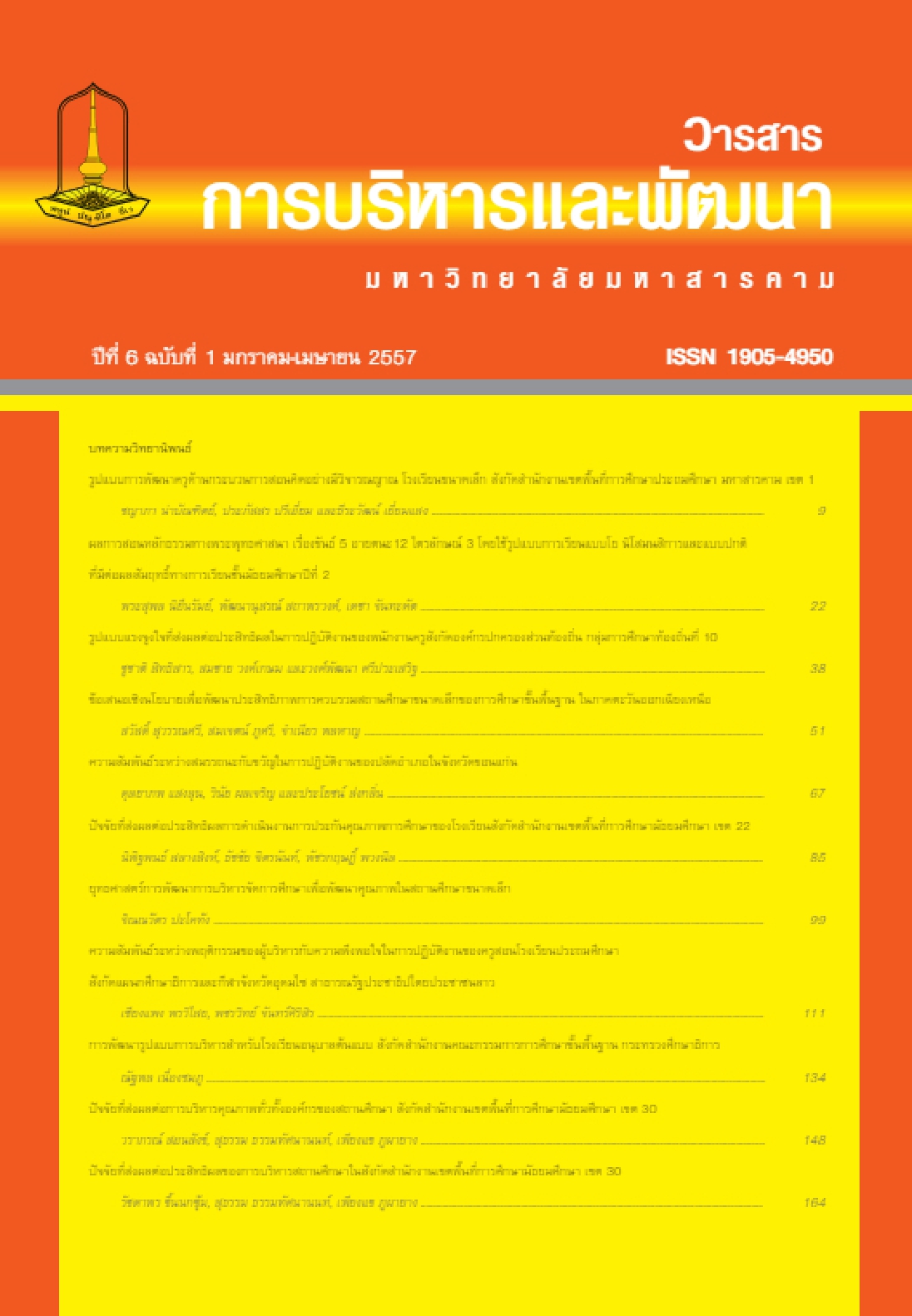Teacher Development Model on Teaching Critical Thinking Process in Small Schools under the Office of Maha Sarakham Primary Educational Service Area 1
Main Article Content
Abstract
The objectives of this research were to: 1) study the factors on teaching critical thinking process for teachers in small primary schools under the Office of Maha Sarakham Primary Educational Service Area 1, 2) design the development model for primary school teachers on teaching critical thinking process, and 3) evaluate the development model for primary school teachers on teaching critical thinking process. The subjects, selected through the purposive sampling, were eighteen teachers from two of each nine small schools under the Office of Maha Sarakham Primary Educational Service Area 1 at Keong-lard Phattana Quality Development Center. The research was conducted by observation, questioning, interviewing, focus group discussion, satisfactory evaluation including knowledge and understanding test by using pretest and posttest. The qualitative analysis was analyzed by descriptive analysis and quantitative analysis was used by percentage, mean, standard deviation and t-test.
The results of the research were as follows:1. The factors on teaching critical thinking process for teachers in small primary schools consisted of indication of problems, data collection, reliability consideration of data source, setting up hypothesis, references conclusion and decision making.
2. The development model for teachers in small primary schools on teaching critical thinking process consisted of four main parts: principle, objective, development technique including evaluation and assessment.
3. The evaluation of development model for teachers in small primary schools on teaching critical thinking process by training arrangement revealed that the training participants who had gained knowledge and understanding before and after the training was significantly different at the .01 level higher than the assigned criteria. The trainees could apply their knowledge for planning learning activities and produce a high quality of learning plan focusing on critical thinking.
Downloads
Article Details
References
Academic Department, Ministry of Education. Concluded Report of the 5th Workshop in Educational Research titled “The Application of Research Findings in Educational Research, ” Bangkok: 1993.
Areerat, Pisootta. Development of Learning Reform Model by Computer. Doctor of Philosophy Thesis in Computer Science, Computer Science Department, Graduate School, King Mongkuts Institute of Technology North Bangkok.
National Educational Commission. Learning Reform for Student-Centered. Bangkok: The Office of National Educational Commission, 2000.
Netpisanwanich, Woranuch. Development of Training Model through Case Study Coo[erative Learning for Developing the Professional Nurse’s Critical Thinking. Doctor of Education Thesis in Educational Technology, Audio Visual Department, Chulalongkorn University, 2001.
Rodrangka, Wantipa. An Evaluation of Process Skill and Problem Solving in Bangkok. Institute of Academic Quality Development (AD), 1997.
Sangkaew, Penjan. A Research Report of Rajahat Institute Students’ Potentiality. Pechaboon: Faculty of Management Science, Pechaboon Rajabhat Institute, 2002.
Tanhikon, Boobpachat. Electrical Media in Cooperative Learning Context. [Online] 2003 from htpp: //www.ku.ac.th/emagazine/may/47/it/ ecollorative.html [1 September 2005]
Trakoonsarit, Warapon. A Presentation of Web Instructional Model through Project Work Learning for Team Learning of King Mongkuts Institute of Technology Thonburi. Doctor of Education Thesis in Educational Technology, Audio Visual Department, Chulalongkorn University, 2002.
Wonganutarote, Preeyapon. Vocational Education Technique and Instruction. Bangkok: Pimdee. Dechtongpong, Suyanee. The Effect of Cooperative Communication Media on Meta-cognition and English Writing between Thai Students, and Chinese Students in University Level. Doctor of Education Thesis in Educational Technology, Audio Visual Department, Chulalongkorn University, 2002.
Hsiao, Jy Wana Daphne Lin. 1996. CSCL Theories. Available online at http: //www. edb.utexas.edu/ csclstudent/Dhsiao/theories.html [2003, December 15]. Johnson. D.W. and Johnson, F. Joining together: Group theory and group skills. (4th ed). Engle wood cliffs, NJ: Prentice – Hall, 1994 .
Kirkpatrick, Denise. 2001. Promoting online collaboration. Available online at http: //www.unescobkk.org.ODLdoc/kirkp-online%20collaboration.rtf [2004, May 15].
Slavin, R.E. Cooperative Learning. N.P.: Massachusette Allyn and bacon, 1990.
Tinzmann, M. B. 1990. What is the collaborative classroom. Available online at http: //www.ncrel.org./sdrs/areas/rpl_esys/collab.htm [2004, May 15].


